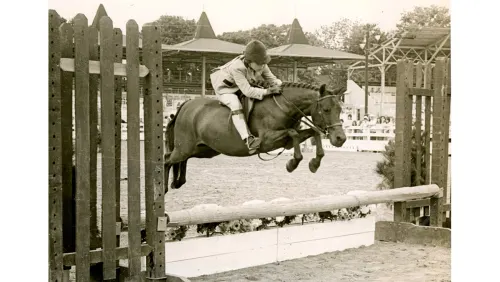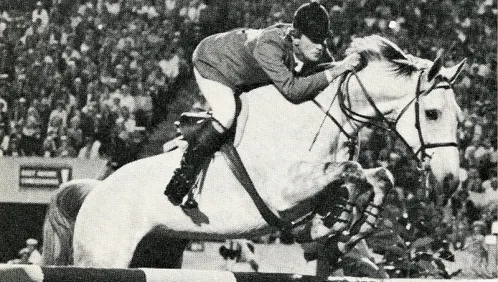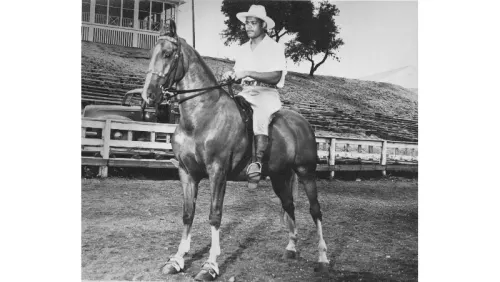Thirty-four years ago, before he was known as one of the go-to equitation coaches, Andre Dignelli won what is now the Platinum Performance USEF Show Jumping Talent Search Finals—East on a borrowed horse that he’d only been riding for a week. With the conclusion of these same finals last weekend, we looked back at how the renowned equitation coach won his first major championship.
Dawn Detwiler’s coverage of Dignelli’s win for the Chronicle in 1985 was as follows:
Andre Dignelli broke all the unwritten rules on his way to winning the Rolex United States Equestrian Team Medal Finals East, held at the team headquarters in Gladstone, New Jersey, on Oct. 5-6.
First, Dignelli owns only one horse, while most of his competitors chose from a string of many, or at least have bought, sold and leased many mounts searching for the perfect match.
Most winners of top equitation prizes school for a long time, often for years, with that special mount. Dignelli sat on his borrowed horse for the first time only a week before the finals. The horse was not a bomb-proof equitation campaigner, but a winning junior jumper who did not produce the monotonous flat trajectory of the typical equitation mount.
Andre Dignelli had only been riding Dark Sonnel for a week before the Rolex United States Equestrian Team Medal Finals East. Dawn Detwiler Photo
Finally, most equitation winners spend most of their time riding, and little or none grooming or cleaning stalls. Every morning, 18-year-old Dignelli drives 45 minutes from his hometown of Yorktown Heights, New York, to Judy Richter’s Coker Farm in Bedford. Once there he cares for his horse, which lives in a temporary stall in a tractor shed, returns to Yorktown, and works all day in his family’s dry-cleaning store. He then drives back to Bedford to ride and feed at night.
“It’s great to see someone who really wants it, and has the talent, go far,” said Richter, who has only worked with Dignelli for about a year. Dignelli has always ridden under the eyes of his brother Michael [Dignelli], whom Richter calls a good groundman.
The Beginning
The USET Medal class was developed to encourage riders to develop those skills which would eventually help them in the jumper ring, and hopefully in international competition. The event’s phases—on the flat, through a gymnastic grid, over a jumper-oriented course, and for the best four, a ride-off on each other’s hoses—reflect the mastery of these skills.
The competition opened Saturday with 87 competitors broken into groups to perform on the flat before judges Hap Hansen and Linda Allen. Rain forced the phase indoors, where, riders said, the noise of water pounding on the roof almost kept them from hearing the commands. During the flat phase, riders must demonstrate lengthening of the gaits, which is rarely seen in other equitation classes, and the counter-canter, which is now more common. Both are essential in jumper competition.
ADVERTISEMENT
By Saturday afternoon, course designer Chrystine Jones decided it was safe to hold the gymnastics phase outdoors in the sand ring. “The rain came down so hard it packed the ring like a beach,” said Jones. “But the water ran off, so I said go ahead.”
After the completion of the first two phases, no standings were announced. On Sunday morning, riders started over Jones’ course not knowing if they were first or last.
The course turned out to be an excellent test. It was not so dreadfully precise that a hairbreadth’s mistake crushed all hope. Instead of the course tripping up the contestants, it seemed clear those riders in trouble simply misjudged.
Predictably, the water jump caused many refusals, even though riders had been allowed to school over it on Friday. The liverpool at the third part of a triple also caused some spooking and run-outs.
Finally, after a day and a half, the standings were announced in numerical order, not according to the judge’s preference. Six numbers were called for the fifth through 10th places, and four for the ride-off. Three riders trained by Frank Madden and Bill Clooney—Chris Kappler of St. Charles, Illinois, and sisters Susan and Sandra Anderson of Calgary—joined Dignelli for the final phase.
The Ride Off
Each rider had to jump a new course first on his own horse, then on each of the horses belonging to the other finalists for a total of 16 trips, four each. Riders had only two minutes to school the unfamiliar mounts and could only jump one vertical and one spread fence in warm-up.
Sue Anderson led off with a very nice round on her Duty Free. Chris Kappler wavered a little in spots on his Candy. Sandra Anderson’s horse, Andante, rattled quite a few fences. Dignelli then went in, took charge of the course, and rode a masterful round on the Richter’s Dark Sonnet.
With the switching of horses, the test really began. Kappler had trouble keeping Duty Free’s energy level up but had nice rounds with the other two horses. Sandra Anderson had pretty rounds until the last, in which a tired Dark Sonnet did not have much flair. Dark Sonnet’s bigger jump often left Susan Anderson a little unseated, and she had trouble through the combination on her sister’s Andante.
Dignelli earned his win. He did not create a typically pretty equitation picture in his second round, but made no mistakes and had Andante just where he wanted him. A smooth performance on Kappler’s easy-going Candy followed. In Dignelli’s fourth round, Duty Free knocked down one panel of the second fence, but it seemed evident that the horse was tiring and the rider was not a fault.
ADVERTISEMENT
“[The plank coming down] really threw me for a few strides,” said Dignelli afterwards, “but I just had to keep going.”
After the 10th through fifth place winners were named, the top four waited patiently. Susan was named fourth and Sandra third. After much shuffling of papers and a long pause, the announcer incorrectly stated the reserve champion was one of the bottom six. Finally, after more paper shuffling and another pause, Chris Kappler was named reserve champion and Dignelli knew the remaining ribbon was his.
The champion was quick to push the credit onto his horse. “He [Dark Sonnet] was very good in all the phases. I thought he was competitive, but I was surprised to be called back,” he said with a modest smile. “All the horses were good. They all went so well. This is the best test because everyone gets to ride more [than in the Medal or Maclay].”
Richter pointed out that Dignelli carefully studies the riding around him. “He hasn’t had many lessons at all,” Richter said, “but he is always around. He watches Norman [Dello Joio, who keeps his horses at Coker] all the time, and he really pays attention. He knows the other horses and studies the other riders which helped him with the switches.”
It was Richter’s decision that brought Dignelli and Dark Sonnet together only a week before the finals. “Andre’s horse is strictly an equitation horse,” she said. “He just doesn’t have the scope for this kind of course. I think we have him in the groove for indoors, and we didn’t want to blow it.”
Richter said at first Dignelli was hesitant to ride Dark Sonnet.
“But I said ‘You’re gonna have to ride him,’ and Andre gave it his all to make it work. He made himself believe it would work.”
Dignelli, who graduated from high school in June, will be studying business at the University of Bridgeport in Connecticut in January. After coping with the Medal and Maclay finals at the indoors, Dignelli hopes to move into the jumper ring.
“Hopefully, this win will open some doors for him,” said Richter. “This may be a very good start.”















